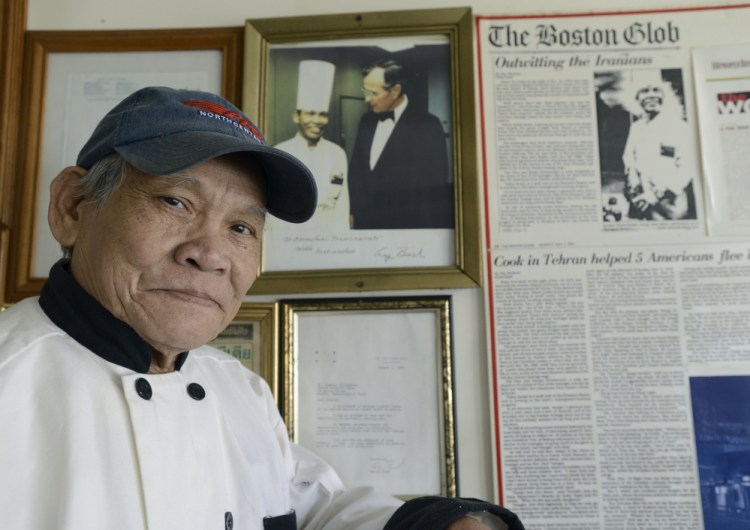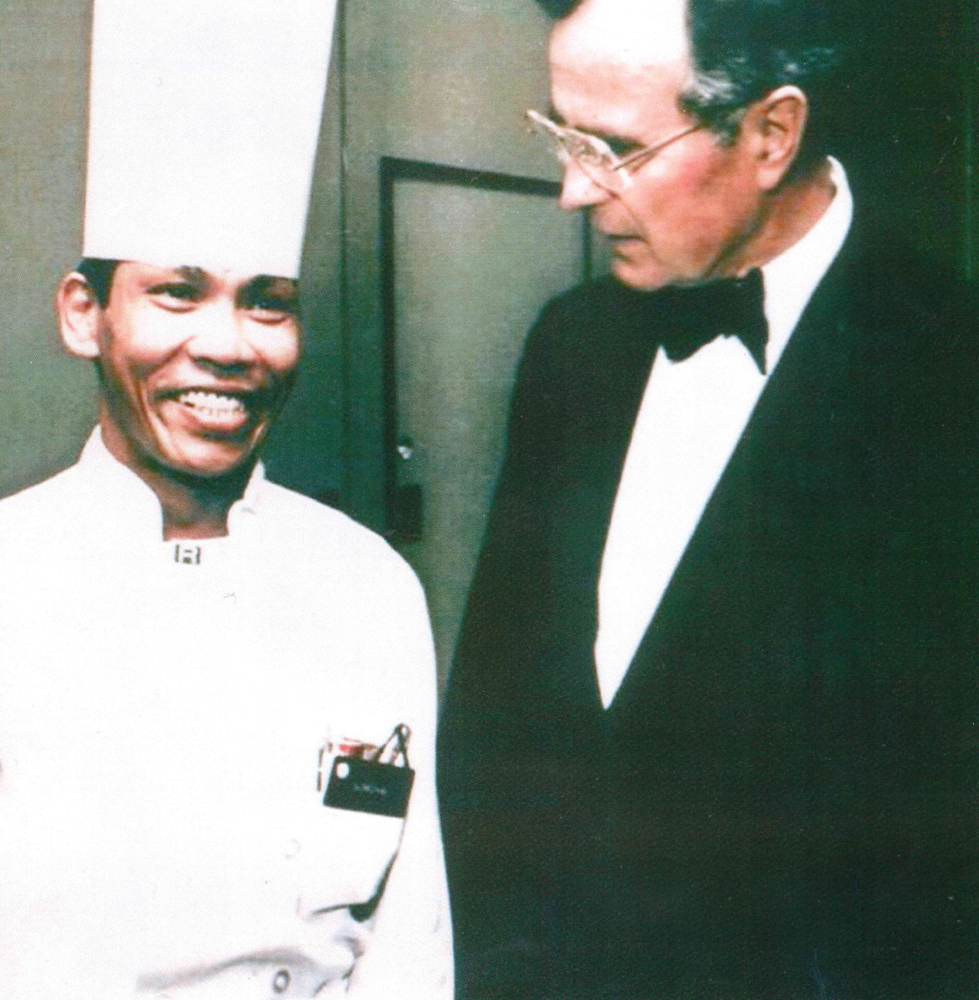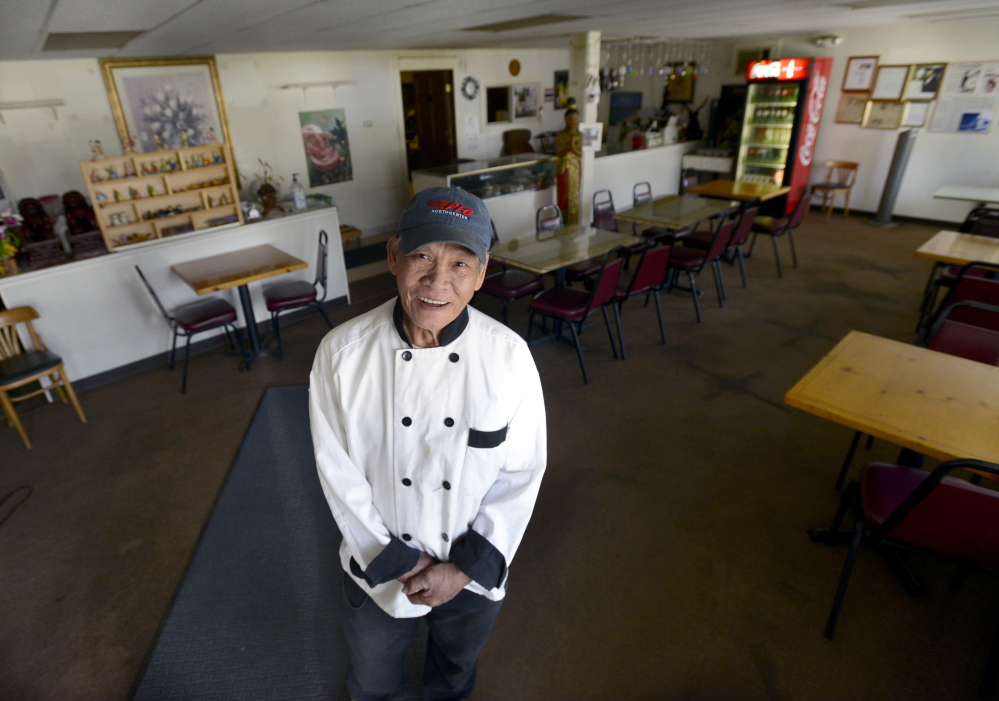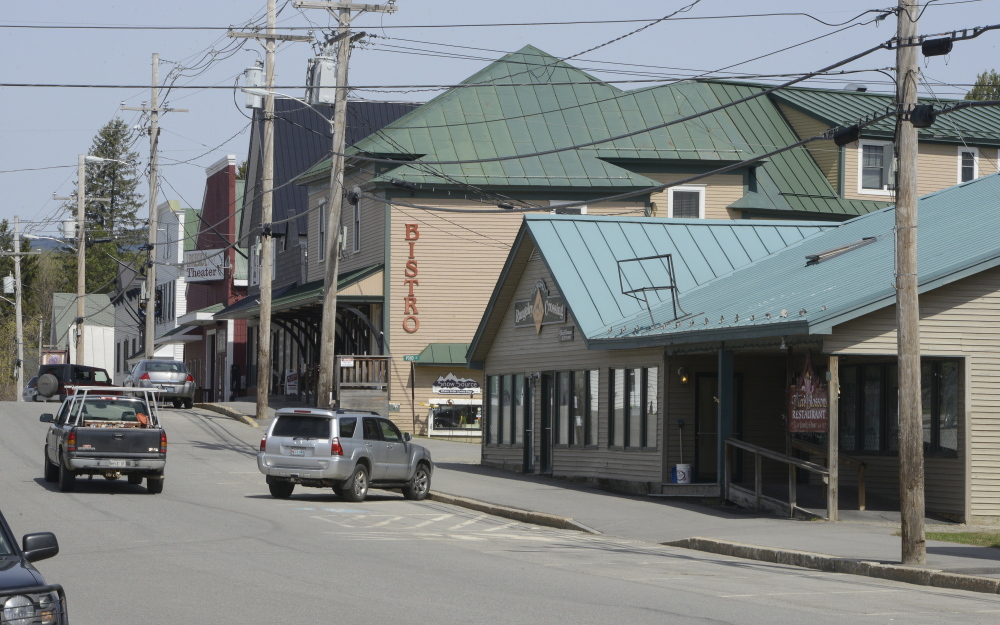RANGELEY — Somcha Sriweawnetr waited nervously at the Tehran airport while customs officials scrutinized his passport and tried to decide whether to let him board a plane out of the country.
Sriweawnetr’s hair had grown long and he had lost a lot of weight in the year and a half he spent on the run since helping five Americans escape from Iran.
After about a half hour, they let him through. He walked 10 steps toward freedom before one of the customs officials called him back.
“I almost had a heart attack,” Sriweawnetr said.
Nearly 36 years after that frightening moment, Sriweawnetr lives a quiet life in Maine and is trying to sell his small restaurant in Rangeley, Thai Blossom, so he can retire at the end of the summer. The 73-year-old chef, nicknamed Sam by George H.W. Bush, is now just a footnote in history. The 2012 movie “Argo” told the story of the narrow escape of five Americans from Iran during the takeover of the U.S. embassy in 1979. It’s Sriweawnetr’s story, too, but the filmmakers left him out of the movie.
Sriweawnetr is modest about his role in the caper, although he does keep a few old news clippings and photographs hanging on the wall of his restaurant as a reminder. Others who were in Tehran during the 1979 hostage crisis say they will never forget the young Thai cook and how he put his own life at great risk to help those five Americans.
Kathleen Stafford, who worked in the consular office with her husband, Joseph, was one of the five who escaped and said Sriweawnetr “saved our lives.”
“These were extraordinary times, and diminutive Sam stood up to protect us,” Stafford wrote in an e-mail interview from Banjul, The Gambia, where Joseph Stafford is chargé d’affaires. “I don’t believe you come across that sort of valor very often.”
• • • • •
In the mid-1970s, Somcha Sriweawnetr was cooking at a big hotel in Thailand. A Korean man came in, looking for a chef for his new restaurant in Tehran. It was a great opportunity. Sriweawnetr could make more money there that he could send home to his wife and children.
Two weeks later, he found himself on a plane to Iran. He worked at the Korean restaurant for about a year before the political landscape shifted.
Before the revolution, Sriweawnetr said, Iran was a lot like Europe. He and his friends spent their spare time at the beach. They went bowling or to a bar to shoot pool. Then he began to see more rallies in the streets. In the winter of 1979, Mohammad Reza Pahlavi, the Shah of Iran, was overthrown and left the country. Soon after, the monarchy was abolished, replaced by the interim Bazargan government and religious leader Ayatollah Khomeini, who began urging students to target Americans.
“I remember when Khomeini came in,” Sriweawnetr said in broken English, “the first month I saw husband and wife cannot go in the same taxi. … That was terrible. They separated everything.”
The Korean restaurant where Sriweawnetr worked was shut down because the Iranians didn’t want the place selling alcohol.
In summer 1979, just a few months before the American embassy was attacked, Victor Tomseth, deputy chief of the mission at the U.S. embassy – the No. 2 person in charge – needed someone to help out in his apartment and was introduced to Sriweawnetr.
Tomseth knew Sriweawnetr was used to higher wages than Tomseth could afford to pay him, so he cut the young Thai cook a deal.
“I had a second bedroom in my apartment, and I said he could use that if he wouldn’t mind occasionally cleaning up and even fixing me a meal,” Tomseth recalled, “and, in the meantime, I would help him look for another job.”
Tomseth connected Sriweawnetr with three Americans who had houses on the same street in the northern section of Tehran. By pooling their funds, they could pay him well. Kathryn Koob, who ran an organization called the Iran-American Society, was one of his new employers and would later become one of 52 American hostages held for 444 days. The years have made her memories a bit cloudy, but Koob, who now lives in Iowa, said, “I just remember that Sam was a really nice person, and he was an awfully good cook.”
• • • • •
Three days after the Nov. 4 takeover of the U.S. embassy, Sriweawnetr got a call from Tomseth asking for help. Some Americans had escaped capture, and now they needed a place to hide.
When Iranian militants had climbed over the gate and begun taking hostages, five employees – Joseph and Kathleen Stafford, Robert Anders, and Mark and Cora Lijek – escaped out the back door of the consular building. They turned left and headed toward the British Embassy, but demonstrations blocked their path.
“There were six or seven other officers who exited with us,” Stafford recalled. “They turned right and were captured within 10 minutes.”
The group of five hurried to Anders’ and the Staffordses’ apartments to regroup. Tomseth heard about their predicament at the Iranian Foreign Ministry, where he and Bruce Laingen, the chargé d’affaires, were trying to negotiate an end to the crisis.
Initially, the British Embassy agreed to take in the five Americans, but the plan was derailed after just one night when their embassy was briefly overrun by Iranian students, prompting the British to rescind their offer. Tomseth thought of Sriweawnetr, who had keys to the homes of the three embassy employees he worked for in northern Tehran.
Sriweawnetr didn’t hesitate when Tomseth called him and, speaking in Thai, asked him to hide the five Americans. He knew the situation was grave and deteriorating fast. The Iranians had captured and hanged people who had been working with the Americans.
“If I don’t help them,” Sriweawnetr said, “if they walk on the street, if student or Iranian know he is an American, they will catch him and kill him for sure because the list of five people missing, everybody know.”
Sriweawnetr told Tomseth to send the five Americans to the home of John Graves, a public affairs officer who had already been taken hostage at the American embassy. It was Tuesday; the Brits waited until dark, then drove the escapees to the house.
“Sam was there, waiting for us,” recalled Mark Lijek, who now lives in Washington state. “He had all the doors open so we could step in quickly.”
For the next couple of days, Tomseth continued to talk to Sriweawnetr and the Americans, but then the Iranians told him he could not make local calls. Tomseth himself would be held captive separately from the other hostages for well over a year.
As it became clear that negotiations were at a standstill and the crisis could go on indefinitely, fear began to take over for Lijek and the other Americans Sriweawnetr was hiding. “Your mind sort of starts feeding on itself, and you start imagining all of the bad things that could happen,” Lijek said.
Life in hiding was both anxiety-provoking and boring. There were a few books in the house, but they were all in French, Lijek recalled. There was a television, but Iranian TV held no interest, and the only VCR tape was of an old MacNeil-Lehrer News Hour show. They found a deck of cards and passed the time playing poker with matchsticks. Each day Sriweawnetr brought the group the English-language Tehran Times and the Farsi-language newspaper. He bought groceries and cigarettes, but refused to accept any reimbursement for them.
“We were totally dependent on him,” Lijek said, “and I never felt that that was a risky thing. I worried about being caught, but I didn’t worry about Sam being the reason for that.”
• • • • •
Sriweawnetr worried constantly about being discovered. He knew the neighbors were watching and wondering. Why were the curtains always closed? If Sriweawnetr was in the house alone, why was he shopping so much? Was he really eating all that food himself? He worried that one of them would turn them in to the komiteh, the local revolutionary committee.
Sriweawnetr told the group that he felt the house was no longer safe, and they would have to move again. They planned to go to Kathryn Koob’s house early Saturday morning. Sriweawnetr enlisted an Armenian friend with a taxi to help make the move while it was still dark.
As the day dawned at the Koob house, they saw that this location was even more problematic. The house had tall windows and no curtains, and it lacked a tall wall like the one that surrounded Graves’s house.
Once again, the Americans felt they were not safe. Anders had previously been in touch with his counterpart at the Canadian embassy, but had not immediately accepted the embassy’s offer of assistance because of concern that their large group might put other lives at risk. Now he accepted their help.
“We were running out of money and clothes, which always seemed to be in the washer when we had to run out of the house again,” Stafford said. “That is when we called the Canadians, who were generous and courageous just like Sam. They said they would take us in.”
The Brits picked up the group at the Koob house, and the Americans said goodbye to Sam without telling him where they were going. They did not want to put his life at risk should he be captured.
“If it had not been for Sam’s bravery,” Stafford said, “we would have been picked up by the militants looking for stray Americans and our fate would have been that of the other hostages who were held, some in basements, some in solitary confinement, some facing fake firing squads – an endless 444 days of fear and hardship.”
Just a couple of hours after the Americans left for the Canadian embassy, Sriweawnetr said, Iranian students with guns showed up at Koob’s house. With a gun to his head, Sriweawnetr admitted to working for Americans but said they were all hostages now.
The five Americans, now safe, were “lucky, so lucky,” Sriweawnetr said. “They would have killed them all.”
• • • • •
In a scheme that became known as “the Canadian Caper,” the five Americans managed to get through customs and flew home to the United States through Toronto. A Canadian newspaper wrote a story about it and mentioned that the five escapees had been helped by a Thai chef.
Now Sriweawnetr was a wanted man. The Iranians began hunting him, he said, “like a dog.”
“For a year and a half,” he said, “I keep hiding everywhere. No job, no place to live, no money, no nothing. That’s my life.”
Sriweawnetr stayed with Thai, Chinese and Filipino friends he had worked with at the Korean restaurant. Even some old customers helped him. Sometimes he stayed in their basements. Some houses, he said, had secret doors. The militants began doing regular house-to-house searches. If they came to the front door, Sriweawnetr escaped out the back. If they came to the back door, he went out the front door.
If the police stopped him on the street and asked for his passport, Sriweawnetr would tell them, in fluent Farsi, that he didn’t have one, and they’d let him go.
Throughout this period, he said, he just kept telling himself, “I will survive. I’m not going to die here. I didn’t do anything bad.”
Tomseth knew that Sriweawnetr was still alive. One day, a “care package” containing fresh clothes and a pair of glasses arrived for him at the ministry. He was told it had been delivered by “an Asian man.”
Tomseth’s wife, who was born in Thailand, and his children had been evacuated from Iran the year before and were living in Oregon. Occasionally Tomseth was allowed to speak to her by phone, and he would ask her to get some money to Sriweawnetr through the Thai embassies in Washington and Iran.
Once the pressure of the chase lifted a bit, Sriweawnetr turned to the Swiss embassy for help getting out of Iran. The embassy bought him a plane ticket to Bangkok using money sent by Tomseth’s wife.
Before leaving Iran, Sriweawnetr made one last trip to Tomseth’s apartment. He gathered items he knew were important to his friend, including a guitar, to take home to Thailand with him, hoping he might have the chance to return them some day. Tomseth said he still has the guitar that Sriweawnetr rescued.
In January 1981, just three days before the American hostages were released, Sriweawnetr went to the airport. His new Thai passport transliterated his name as Somjai Sriweaw, and he had been using that spelling on the street. Now, he prayed the name was different enough not to ring any alarm bells in customs.
He looked nothing like his passport photo. After the hardships of the past year, he was a scruffy version of his former self. “I hand the passport to them,” he said. “They look in the passport, looked at me. Looked at the passport, looked at me. But I looked different. And they were confused by the name.”
After calling Sriweawnetr back to peruse his documents once again, customs officials finally allowed him to board the plane.
He arrived in Bangkok penniless and took a taxi home from the airport. It had been several years since he’d seen his family. His wife, Chaluay, had thought he might be dead and didn’t recognize him at first, a memory that still amuses Sriweawnetr. Chaluay paid for the taxi, and Sriweawnetr was reunited with his young children – a son named Somkiat; Sililuck, now known as Sara; and Luckana, who is called Lucky.
“Then,” he said, “I cry.”
• • • • •
During his captivity, Tomseth thought a lot about what could be done to express appreciation for what Sriweawnetr had done. He knew the U.S. government was unlikely to give him any money. And, although it would be a nice gesture, of what use would a medal be to him?
“The thought occurred to me that perhaps the best thing we could do for him is give him a chance,” Tomseth said.
After Tomseth was released and came home to America, he enlisted Democratic Sen. Paul Tsongas of Massachusetts to sponsor a so-called “private bill,” allowing Sriweawnetr to go to the head of the immigrant visa line. It took a little over two years, but that’s how Sriweawnetr and, later, his family came to the United States.
Sriweawnetr, who had gone to work for a Sheraton Hotel in Dubai after he escaped Iran, transferred to the Sheraton in Boston. He met Tsongas and Vice President George Bush, and started a couple of small restaurants in Boston.
After his children arrived in the United States, the family would visit Maine to sightsee. Sriweawnetr came to like Rangeley and its small-town feel.
“I’d been in so many big towns,” he said. “I got in a lot of trouble in big towns. Here, you can stop your car and leave it overnight, and nobody will steal your car.”
Sriweawnetr and his sister have run the Thai Blossom restaurant on Main Street in Rangeley for 15 years. Sriweawnetr, now known as “Chef Sam,” goes to Boston occasionally to visit his daughter and son-in-law, who run the family’s other business, Equator, a more upscale Thai restaurant in the South End. He has seven grandchildren, all of them born in the United States.
In the summer, tourists come into Sriweawnetr’s Rangeley restaurant, read the old articles on the wall, and go back into the kitchen to shake Chef Sam’s hand and thank him for what he did so many years ago.
Sriweawnetr hopes to train whoever buys the Rangeley restaurant on how to make his special sauces. He does not want his adopted town to go without Asian food. When summer is over, one way or the other, he plans to leave Maine. He says he’ll go to Boston first, to help his daughter with Equator, but then he might return to Thailand for a long visit.
Sriweawnetr does not consider himself a hero for the role he played in the Iranian hostage crisis. He says he is “a normal person” who did what anyone else would do.
“If you have the chance to do something right, do something good for (someone), you don’t worry ‘Who are they?'” he said. “When I help them, I don’t think ‘He’s American.’ I think, ‘They are human, they need some help.'”
The people he saved still send him Christmas cards every year.
Copy the Story Link
Send questions/comments to the editors.







Success. Please wait for the page to reload. If the page does not reload within 5 seconds, please refresh the page.
Enter your email and password to access comments.
Hi, to comment on stories you must . This profile is in addition to your subscription and website login.
Already have a commenting profile? .
Invalid username/password.
Please check your email to confirm and complete your registration.
Only subscribers are eligible to post comments. Please subscribe or login first for digital access. Here’s why.
Use the form below to reset your password. When you've submitted your account email, we will send an email with a reset code.